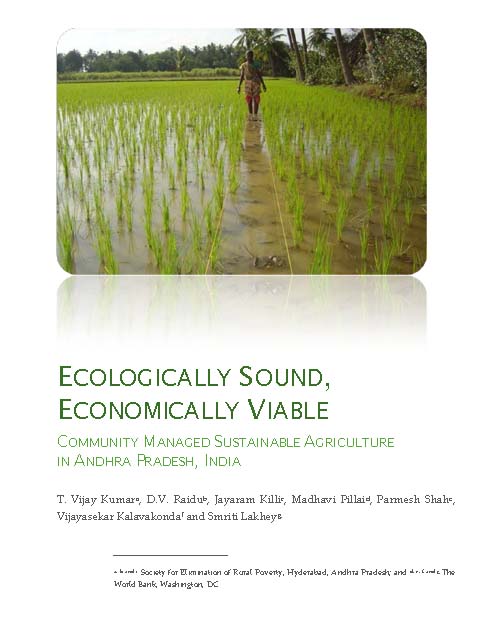Irrigation
Groundwater management in Andhra Pradesh - Time to address real issues – A report by Institute for Resource Analysis and Policy
Posted on 17 May, 2011 02:16 PMWith 49 per cent of the total irrigation from groundwater, the state of Andhra Pradesh accounts for 5.3 per cent of the net groundwater irrigated area in the country.
Ecologically sound, economically viable community managed sustainable agriculture in Andhra Pradesh – A report by Society for Elimination of Rural Poverty and World Bank
Posted on 15 May, 2011 09:56 PM This report by Society for Elimination of Rural Poverty and World Bank deals with Community Managed Sustainable Agriculture (CMSA) in Andhra Pradesh. The paper also analyses the initial results of economic and environmental impact of CMSA, distills the key lessons learned from the Andhra Pradesh experience, and draws possible implications for future.
This report by Society for Elimination of Rural Poverty and World Bank deals with Community Managed Sustainable Agriculture (CMSA) in Andhra Pradesh. The paper also analyses the initial results of economic and environmental impact of CMSA, distills the key lessons learned from the Andhra Pradesh experience, and draws possible implications for future.
To address the adverse impacts of green revolution, the alternative approach to manage agriculture i.e., CMSA is being tested and practiced in the State. The CMSA approach replaces the use of chemical pesticides with a combination of physical and biological measures—including eco-friendly bio-pesticides—and complements it by adopting biological and agronomic soil fertility improvement measures leading to reduced use of chemical fertilizers.
Hydrological and farming system impacts of agricultural water management interventions for sustainable groundwater use in North Gujarat - A paper by Institute for Resource Analysis and Policy
Posted on 15 May, 2011 08:56 PMThe report by Institute for Resource Analysis and Policy (IRAP) and Society for Integrated Land and Water Management (SOFILWM) presents the findings of a research study undertaken in north Gujarat region, an area which has been undergoing significant changes in its farming systems as a result of several developmental interventions.
The study looked at a project initiated by IWMI and managed by SOFILWM in which water-efficient irrigation devices, water-efficient crops and land management practices were introduced among farmers in an effort to help them cut down groundwater use in irrigated agriculture without adversely affecting the economic prospects of farming.
Pampered views and parrot talks – In the cause of well irrigation in India – A paper by Institute for Resource Analysis and Policy
Posted on 15 May, 2011 06:14 PMIt is widely held that surface irrigation is becoming increasingly irrelevant in India’s irrigation landscape in spite of increased investments, and therefore future investments in irrigation should be diverted for well irrigation.
Future water solutions for India - a paper by Himanshu Thakkar in the Palgrave Development journal
Posted on 13 May, 2011 03:58 PMThis paper by Himanshu Thakkar published in the journal Development looks at the daunting challenges that future water demand places on India a
An analysis of West Bengal Ground Water Resources (Management, Control and Regulation) Act 2005
Posted on 11 May, 2011 02:17 PMIntroduction
Towards a Kisan Swaraj Policy based on people's control over agricultural resources
Posted on 11 May, 2011 07:10 AM This pan-Indian outreach effort involved dialogues with tens of thousands of citizens, demanding that the nation should devote urgent attention to the continuing agricultural crisis and allocate highest priority to the agriculture sector, ending decades of neglect.
This pan-Indian outreach effort involved dialogues with tens of thousands of citizens, demanding that the nation should devote urgent attention to the continuing agricultural crisis and allocate highest priority to the agriculture sector, ending decades of neglect.
Addressing the water crisis in Gujarat, India - A report by Columbia Water Center
Posted on 28 Apr, 2011 05:06 PMA large number of farmers and well operators were interviewed in the process. Data was also collected from the power utility that supplies power to this region. Along with this the climatic peculiarities of the region, farmers and well users perceptions on ground water management and use were also collected.
History of irrigation in Bihar – Ancient, British and upto Pre-plan Period – A report by the Water and Land Management Institute, Patna
Posted on 23 Apr, 2011 10:29 AMIrrigation is being practiced there since ancient times dating back to Kautilya, who lived in Patliputra (now Patna), which was the capital of the mighty Mauryan empire (400 BC). Kautilya had laid down the principles on rainfall and irrigation in his famous book Kautilya Arthasashtra.





